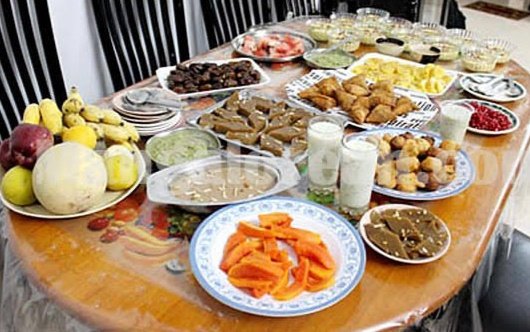During the month of Ramadan, it is very important to maintain good health in order to carry out religious activities as well as daily activities. And that's why nutritionists say that after not eating for a long time, the selection of food items in Sehri and Iftar also becomes important. There are some changes in the way of life at this time, there is also a change in the type of regular work.
.jpg)
Responding to a question on how an adult should fast while fasting or what kind of food should be consumed during fasting, Golam Mawla, a professor at the Institute of Nutrition and Food Science, Dhaka University, told the BBC to eat easily digestible food as much as possible Will.
However, according to him, you can't eat too much.
Nutritionist Professor Nazma Shaheen says there is no need for a separate diet for fasting. However, you have to eat more watery foods, but pure water and fruit juice are more useful.
"It is also important to know where the iftar is being collected from. In this case, home-made food is the safest. Iftar fried in too much oil can be harmful to the body," he said.
Golam Mawla and Nazma Shaheen both think it is better to avoid oily food and fried burns. Rather, fruits and dates will provide nutrition and energy to the body.
Read more:
What happens to your body when you fast for a month
Should children be allowed to fast?
Rosa: Six very well-known misconceptions

Image caption Nutritionists say that a doctor should be consulted during fasting or taking medicine
Here are some tips for fasting:
- Not fried food
Professor Golam Mawla says fish, pulses and rice are the ideal food. It would be better to avoid chicken and eat chicken in the morning. However, vegetables and pulses will be good for the body. Professor Nazma Shaheen says that a person must first understand which is not good for his body. What seems harmful should be avoided.
- What will be on the food list?
Water, fruits, chira, bread, rice, vegetables, pulses, eggs, light khichuri can be eaten. Golam Mawla says quality Halim will be beneficial for the body. It increases strength.
- Be careful
Foods like biryani, tehri are identified as heavy foods. Professor Golam Mawla says it is not bad to eat lightly oiled Tehri after Iftar from time to time.
- Regular food should be given importance
Nutritionist Nazma Shaheen says that usually the food that a person eats regularly during Ramadan is enough for him. However, after fasting for the whole day, one should drink enough water. And if it gets too hot, you have to be careful.
- Reduce physical activity and stay calm
Excessive physical activity during Ramadan can cause problems. Golam Mawla says being lazy is just as harmful as being overworked. So be careful about these things.
- So that it is easily digested
Professor Nazma Shaheen says that a fasting person needs to understand which foods are easily digested. These foods should be given more importance. It is better not to eat foods that cause digestive problems. This is because during fasting, the body's enzymes that are made through the Hajj process are shut down.
- Refrain from eating more than once
Professor Golam Mawla says eating a lot of food at once after fasting all day can be harmful. So there is no way to eat extra food. He thinks that iftar can be done with fruits and vegetables.
- How to eat food?
Golam Mawla and Nazma Shaheen both say that you have to chew slowly and well. Water is beneficial for the body at the beginning of Iftar. Besides, dates play a role in providing energy.
- Soup can be a great food
Soup can refresh the body after a long day of fasting and it is also useful in keeping the digestion process of food in order. Professor Golam Mawla said that it is a vegetable but cauliflower soup or lettuce leaf soup is very beneficial. Lettuce leaves do not contain any gas...
